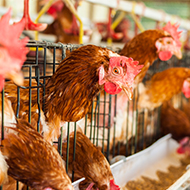Pasteurisation kills avian flu viruses, study finds
Avian flu has been detected in cattle in more than 80 herds in the USA.
Pasteurisation of milk can effectively kill influenza viruses, including the H5N1 strain of highly pathogenic avian influenza, a new government-funded study has shown.
However, unpasteurised milk was found to carry the H5N1 strain, leading the researchers to warn people not to consume unpasteurised milk from areas where there are outbreaks of the disease in cattle.
The study was carried out in response to the ongoing outbreak of the H5N1 strain in dairy cattle in the USA, which so far has seen the virus detected in more than 80 herds across the country, and three dairy workers contract the disease.
The researchers tested a range of different influenza viruses, including avian influenza A viruses and influenza D viruses (which naturally affect cattle). They found that when added to milk, pasteurising temperatures of 63°C and 72°C were enough to inactivate the viruses, although genetic material from the H5N1 strain did remain detectable.
The study is still to be peer-reviewed, but its findings are similar to research conducted in the USA at the Texas A&M Veterinary Medical Diagnostic Laboratory.
Ian Brown, leader of the Avian Virology Group at The Pirbright Institute, said: “Whilst infection with high pathogenicity avian influenza virus in dairy cattle is confined to the USA it is important we support global efforts to better understand the disease, the risks it presents to the public and its control.
“This study on pasteurisation provides important information that underpins disease preparedness and response beyond the USA, should it be required.”
Ed Hutchinson, senior lecturer at the MRC-University of Glasgow Centre for Virus Research and the corresponding author of the study, added: “Raw milk is already known to carry a variety of pathogens, and we would particularly caution people against drinking it in areas where cattle might be infected with H5N1 influenza.
“Human infections with H5N1 influenza viruses can be very dangerous, and they also give the virus more opportunities to adapt to growing in humans with the chance of becoming able to transmit to humans. Pasteurisation of milk in affected areas is a good way to minimise these risks.”
The research was a collaboration between the MRC-University of Glasgow Centre for Virus Research, the University of Edinburgh’s Roslin Institute, The Pirbright Institute, and the Animal and Plant Health Agency.
It was funded by the Medical Research Council, the Biotechnology and Biological Sciences Research Council, the Department for Environment, Food and Rural Affairs, Wellcome, and the Scottish and Welsh governments.
The study is currently available as a preprint article.
Image © Shutterstock



 An Avian Influenza Prevention Zone (AIPZ) has been introduced across Wales.
An Avian Influenza Prevention Zone (AIPZ) has been introduced across Wales.